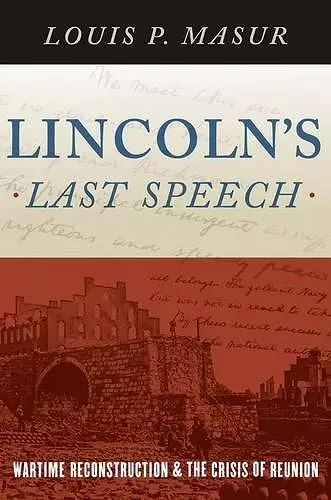Lincoln's Last Speech
Wartime Reconstruction and the Crisis of Reunion
Format:Hardback
Publisher:Oxford University Press Inc
Published:30th Apr '15
Currently unavailable, and unfortunately no date known when it will be back
This hardback is available in another edition too:
- Paperback£13.99(9780190620097)

On April 11, 1865, Abraham Lincoln gave his final speech to thousands gathered in the rain outside the executive mansion in Washington, D.C. Coming two days after Robert E. Lee's surrender at Appomattox, and a week after the fall of Richmond, the crowd expected a victory oration. Instead, they heard the President's ideas about how best to proceed in returning the seceded states to "proper practical relation " with the national government and how to advance the status of freedmen in a nation soon to be without slavery. After Lincoln's endorsement of limited black suffrage, one listener had heard enough. Walking away, John Wilkes Booth remarked, "That is the last speech he will ever make. " Three days later, he made good on his threat. Significant in part because it was his last, Lincoln's April 11th speech is also particularly important for providing us with the president's final public thoughts on the problem of reconstruction, a process, as he said that night, "fraught with difficulty. " In Lincoln's Last Speech, renowned historian and author Louis P. Masur uses the occasion of this speech to trace the debate over reconstruction policies--which, he shows, began not with war's end, but with the war's beginning. Masur reveals how, from the start of the war, restoring the union was foremost on Lincoln's mind, and between 1861 and 1865 he pressed multiple plans of action. Even as battles raged, and the odds of victory continued to shift, the aftermath of war was never far from the thoughts of northern statesmen. Masur traces the evolution of Lincoln's ideas and the debate over reconstruction during the war, from the Proclamation of Amnesty and Reconstruction on December 8, 1863 to the Wade-Davis bill pushed through Congress by radical Republicans in July 2 1864, and Lincoln's resulting pocket veto. In addition to political reconstruction, Masur examines the questions around social reconstruction, the plight of the freedmen and the debate over the place of blacks in American society. And he considers the implications of Lincoln's speech after April 1865, when Andrew Johnson assumed office and the battles over reconstruction ensued. Filling an important gap in the Lincoln literature, Lincoln's Last Speech illuminates the disputed question of reconstruction, from the earliest days of the Civil War up through the president's final address, and allows us to retrace the path that brought him and the nation to reunion.
A concise, useful analysis of Lincoln's generous hope for postwar America, seen against the failures of the actual Reconstruction that followed. * Kirkus Reviews *
ISBN: 9780190218393
Dimensions: 214mm x 162mm x 21mm
Weight: 517g
264 pages